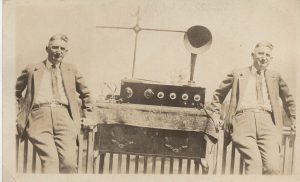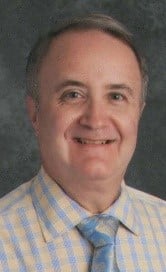 Persistent family genealogists will eventually encounter a relative who died in a state hospital, city shelter, or mental institution. In many instances, that fact may have been hidden, disguised, or made more palatable for public perception. The death of my grandmother’s only brother, John P. Cassidy (1887–1934), presented me with my first “alternative version” of a vital statistic. After Pott’s Disease crippled him and terminated his career as a pharmacist, John spent the last years of his life in the tuberculosis ward of Fall River’s City Hospital. There he dabbled in trick photography and tinkered with his superhetrodyne radio.
Persistent family genealogists will eventually encounter a relative who died in a state hospital, city shelter, or mental institution. In many instances, that fact may have been hidden, disguised, or made more palatable for public perception. The death of my grandmother’s only brother, John P. Cassidy (1887–1934), presented me with my first “alternative version” of a vital statistic. After Pott’s Disease crippled him and terminated his career as a pharmacist, John spent the last years of his life in the tuberculosis ward of Fall River’s City Hospital. There he dabbled in trick photography and tinkered with his superhetrodyne radio.
His obituary falsely reported that he died at the home of his sister – an idealization, rather than the truth. My grandmother believed respectable people did not allow their family members to die in a public hospital. In the same vein, when she filled out John’s death certificate, she reported he was married when, in fact, he had been divorced for fifteen years.
Obituaries sometime tell us more about who created them than they do about the person whose life is recounted. A distant relative, now deceased, whom I interviewed when he was in his late 80s, told me his long-suffering grandmother, Mary (Hannafin) Mahoney, mother of thirteen children, “threw out” her alcoholic and abusive husband, James Mahoney, when their youngest child was around ten. The 1910 census confirmed that separation, with Mary and her children living in their Newport, Rhode Island home, and James counted as an inmate in the Cambridge, Massachusetts City Home.
Obituaries sometime tell us more about who created them than they do about the person whose life is recounted.
James died there later in 1910. An elaborately crafted obituary, however, claimed he had died en route to Holy Ghost Hospital! That explained why he did not die in Newport, so they thought. Buried in the family plot with his wife and children, James’s neatly-carved name and dates belie the turbulence of his life and the years he spent away from home.
Another instance of a fanciful obituary veiled a harsher truth. My great-grandfather’s brother Timothy Dwyer disappeared from Newport city directories in 1893. What happened to him? There were just too many Irish-born Timothy Dwyers to investigate. The answer finally emerged when a friend provided me with a list of burial dates from the Dwyer family plot in St. Columba’s Cemetery in Middletown, Rhode Island. Though Timothy’s name did not appear above ground, the cemetery plot record stated he was buried in August 1945. Timothy’s brief obituary reported that he died at the home of his brother, Patrick M. Dwyer, at 14 Cranston Avenue in Newport.
Through the World War II years, my father spent every Sunday afternoon in that house – he knew of no great-uncle hidden away. Timothy’s death was not recorded anywhere in Rhode Island. I then tracked down the burial permit, which revealed his body had been transferred from Bridgewater, Massachusetts. There I found Timothy died in the State Hospital for the Insane and that he had been a patient for over thirty years.
Such revelations always lead to more questions, some of which just cannot be answered. My family was not alone in how they chose to put a public face on their institutional shame. These discoveries have broadened my understanding of the paper trail every individual generates, especially those who did not die in the bosom of their family. With every record, we must always consider not only who provided the information but also why they chose to present an alternative version of how someone’s life ended – and what that says about the reporter.
Share this:

About Michael Dwyer
Michael F. Dwyer first joined NEHGS on a student membership. A Fellow of the American Society of Genealogists, he writes a bimonthly column on Lost Names in Vermont—French Canadian names that have been changed. His articles have been published in the Register, American Ancestors, The American Genealogist, The Maine Genealogist, and Rhode Island Roots, among others. The Vermont Department of Education's 2004 Teacher of the Year, Michael retired in June 2018 after 35 years of teaching subjects he loves—English and history.View all posts by Michael Dwyer →